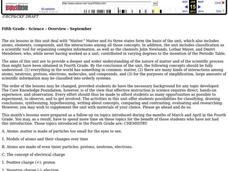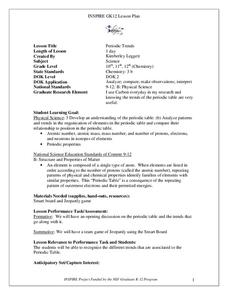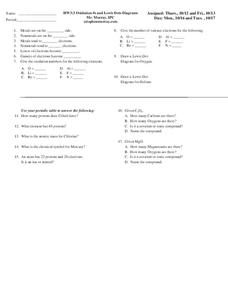Curated OER
VH1 And You Don't Stop - 30 Years of Hip-Hop
Students examine the origin and elements of Hip Hop music and the associated culture. They visit websites and listen to examples of the music.
Curated OER
Physical and Chemical Changes in Food
Ninth graders study food mixtures and substances in order to identify atoms, molecules, elements, and compounds and recognize physical changes that take place in foods.
Curated OER
Matter
Fifth graders investigate the nature of matter and of the scientific processes associated with them in this series of lessons.
Curated OER
INTRODUCTION TO THE PERIODIC TABLE
Students identify the scientist who first wrote the Periodic Table, identify the scientist who amended the Table, state (or write) specific data relating to the history of the Periodic Table, identify at least five elements, and two...
Curated OER
Metals, Non-Metals, Metalloids
Learners describe properties of various elements. They arrange the elements based on properties in order to explain the organization of the periodic table. They label elements as metal, non-metal, or metalloid.
Curated OER
It's 'ELEMENT' ary
Middle schoolers, using a Web site about the periodic table of elements, create spreadsheets representing elements and their properties. They also create graphs that compare the physical properties of the elements.
Curated OER
Carbon: Structure Matters
Students explore the molecular structure of matter and how it can affect the physical characteristics of a specific material. They investigate the role carbon plays in the chemistry of life.
Curated OER
CEENBot Soccer
Students research the history and uses of the different elements in the periodic table. In this chemistry lesson, students explain the significance of an element's valence electrons. They create a multimedia presentation of an element...
Curated OER
Calculating the Average Mass of the Newly Discovered Element: Bean
Students determine the average mass of a new element using masses from three isotopes. In this chemistry instructional activity, students explain what an isotope is. They discuss their importance and uses.
Curated OER
Periodic Table Patterns using Fabulous Periodic
Students explain how elements are arranged in the periodic table. In this chemistry lesson, students group the eggs according to a certain pattern. They compare this to elements in the periodic table.
Curated OER
Periodic Trends
Students identify the different periodic trends. In this chemistry lesson, students discuss how elements are arranged in the periodic table. They apply what they have learned in a Jeopardy team game.
Curated OER
Elements and Compounds
Students explain how radioactive decay occurs. In this physical science lesson plan, students simulate radioactive half-life through an experiment. They graph their data and share their results in class.
Curated OER
"I, Robot"
Students read stories from a robot journal. In this robot lesson students complete definitions and several activities, including a short essay.
Curated OER
Journey to the Center of the Earth I
Students identify the elements of science fiction and write their own example. In this Journey to the Center of the Earth lesson students complete several activities about science fiction, authors and novels.
Curated OER
Compounds and Elements Word Chop Worksheet
In this compound/element learning exercise, students find pieces of words that have been "chopped in half," put them back together and write them on provided lines.
Curated OER
Periodic Table Basics
In this elements worksheet, high schoolers review the periodic table and how the elements are organized in the periodic table. This worksheet has 5 short answer and 4 fill in the blank questions.
Curated OER
Chemical Composition Chart
In this Earth's crust worksheet, students determine the most abundant and least abundant elements in the atmosphere, oceans, and crust. This worksheet has 1 fill in the blank and 11 short answer questions.
Curated OER
Making Atoms
In this atoms worksheet, students determine an atoms based on its protons, and neutrons. Students determine the electron levels for the oxygen atom. This worksheet has 1 multiple choice, 4 fill in the blank, and 13 short answer questions.
Curated OER
Atoms, Elements, Molecules, and Compounds
In this elements worksheet, students review the Bohr model and define negative and positive subatomic particles. Students compare molecules and compounds. This worksheet has 11 short answer questions and 4 problems to solve.
Curated OER
Naming Compounds
In this compounds worksheet, students compare ionic, covalent, and polyatomic compounds and give examples of each type. This worksheet has 1 matching, 3 problem solving, and 4 short answer questions.
Curated OER
Oxidation Numbers
In this oxidation numbers activity, students determine the oxidation number for given elements and draw Lewis Dot Diagrams. This activity has 6 fill in the blank and 11 short answer questions.
Curated OER
Metals and Nonmetals
In this elements worksheet, students determine if the given elements are metals or nonmetals. Students give the valence electrons for other elements. This worksheet has 10 fill in the blank questions.
Curated OER
The Structure of Matter
In this matter worksheet, students compare and contrast chemical and physical properties and explain the relationship between a pure substance and a mixture. Students review the properties of metals and nonmetals. This worksheet has 1...
Curated OER
Compounds and Molecules
In this compounds activity, students compare separating elements of a compound and substances in a mixture. Students review melting and boiling point. This activity has 1 fill in the blank and 5 short answer questions.

























